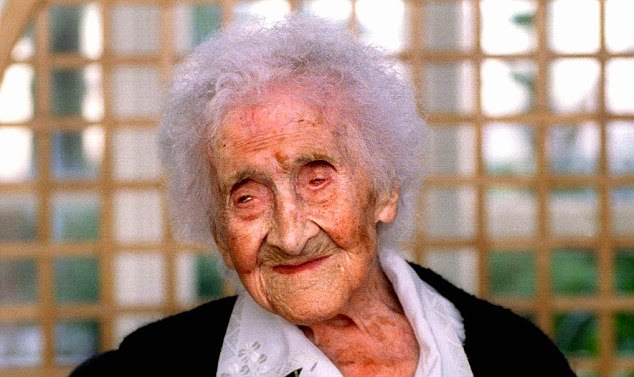
The primary determinant of health for the average person is thought. Not genetics, not exercise or nutrition, but the mind. This has been shown over and over again by the scientific fields of psychoneuroimmunology, psychoneurocardiology, psychoneuroendocrinology, not to mention cancer research and all the various psychosomatic disorders that have been studied.
If you doubt that thought affects health then I will be happy to have a truckload of research evidence dumped at your doorstep (at your expense) that you can take the next few years perusing. On second thought, why don’t I just relate a story.
The oldest documented person that ever lived was a French woman named Jeanne Calment who made it to 122 years, 164 days on this earth.
What was her secret? According to French researcher Jean-Marie Robine, “She never did anything special to stay in good health.”
Jeanne Calment smoked cigarettes (started at age 21), drank port wine and ate a couple of pounds of chocolate sweets a week until she was 119 years old.
She credited her longevity to laughing a lot and not getting stressed out. She is quoted as saying “If you can’t do anything about it, don’t worry about it.”(1) It probably didn’t hurt that her life circumstances — born into wealth and married wealth — enabled a life of ease and comfort; in other words, no mental stress.
Let’s contrast this with someone I knew personally that lived a very healthful lifestyle, ate right, exercised and could be described as being disgustingly healthy. He dropped dead of a heart attack at age 61. Funny enough, this didn’t surprise me because I knew this person had a type “A” personality. I also recall never having seen him laugh; not even once.

Personal stories are all well and good but what does the research say about thought and the major causes of death — heart disease and cancer? The studies on thought and cardiac disease are so well known there is really no point in covering it, but what about cancer?
According to the Journal of Psychosomatic Research, “Extreme suppression of anger was the most commonly identified characteristic of 160 breast cancer patients.” (2)
In other research: “Extremely low anger scores have been noted in numerous studies of patients with cancer. Such low scores suggest suppression, repression, or restraint of anger. There is evidence to show that suppressed anger can be a precursor to the development of cancer, and also a factor in its progression after diagnosis.” (3)
In my opinion, the most interesting thing in this article is that a woman that lived 122 years smoked cigarettes for 100 years without any ill effect. Why didn’t smoking lead her to an early grave? I would say, “Because thought is more important than lifestyle.”
Notes:
1) Retrieved April 28, 2014, from http://anson.ucdavis.edu/~wang/calment.html
2)Journal of Psychosomatic Research
Volume 19, Issue 2, April 1975, Pages 147–153
3)Cancer Nurs. 2000 Oct;23(5):344-9.
Source: Collective Evolution
Related:
- The Man Who Defied Odds, Turned Down Chemotherapy and Drugs and Outlived All His Doctors
- Train Your Brain To Let Go Of Habits – 10 Methods For Creating New Neural Pathways
- How To Clean Your Arteries With One Simple Fruit
- How to Heal Cavities Naturally
- How to Clean Your Liver with 5 Natural Liver-Cleansing Tips
- 5 Food-Medicines That Could Quite Possibly Save Your Life
- 19 Super Foods That Naturally Cleanse Your Liver
- Why Dehydration Is Making You Fat And Sick
- Why You Should Never Throw Away Orange or Banana Peels
- 45 Uses For Lemons That Will Blow Your Socks Off
- After Reading This, You’ll Never Look at a Banana in the Same Way Again
- Garlic Soup Made With 52 Cloves of Garlic Can Defeat Colds, Flu and Even Norovirus
- Science Confirms Turmeric As Effective As 14 Drugs
- Black Seed - 'The Remedy For Everything But Death'
- 11 Ways to Naturally Boost Your Metabolism for Weight Loss
- 15 Plants & Herbs That Can Boost Lung Health, Heal Respiratory Infections & Repair Pulmonary Damage
- Top 10 Healthy Yet Cheap Organic Foods
- Complete history of Monsanto, one of the world's most evil corporations
- Food Matters. You are What you Eat!












COMMENTS